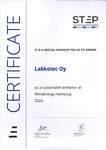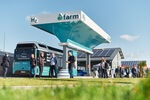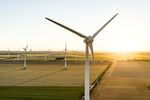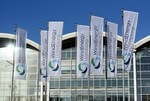News Release from windfair.net
Wind Industry Profile of
WindEnergy Hamburg 2018: It Is Not Just About Generating Power Anymore
It was only a matter of time: Now MHI Vestas Offshore has broken the sound barrier of 10 megawatts of turbine power. It is fitting that the Danish-Japanese joint venture has adapted WindEnergy to go public with this news. The scenery is right, because once again this year more than 35,000 visitors will be in Hamburg, making the Hanseatic city the wind capital not only of Germany, but of the world.
“At MHI Vestas, we are focused not on what others are doing, but being the best at what we do. The V164-10.0 MW turbine is the best proof point yet that we do not accept the limitations of conventional thinking and that we think beyond ourselves. We have embraced the challenge of transforming what is possible in our field,” said Torben Hvid Larsen, MHI Vestas Chief Technology Officer, at the presentation of the turbine.
In fact, a wind turbine of this capacity would have been unthinkable a few years ago. But the wind industry still hasn't lost any of its innovative power. Meanwhile, the sheer inexhaustible power of wind is being used worldwide and new markets are opening to this clean form of power generation. Solar and wind energy have long since caught up with electricity generation from fossil sources in terms of price. "In just under ten years, after 2030, wind power will be the leading method of power generation," said Fatih Birol of the International Energy Agency (IEA) at the start of the fair, confidently.
Nevertheless, dark clouds can be seen on the horizon. The German industry sounded the alarm in view of the slump expected in the coming year. Job losses in the past few months have shocked not only the affected workers but also trade unions and the press reporting extensively on the protests following the last waves of layoffs. Siemens Gamesa CEO, Markus Tacke, called the dismissals "adjustments", only to quickly add that nothing is more important for the industry than a stable policy - and that is currently not the case in Germany. However, there have been phases of scepticism in the past: "First it was the offshore sector, now it's the onshore sector," he added.
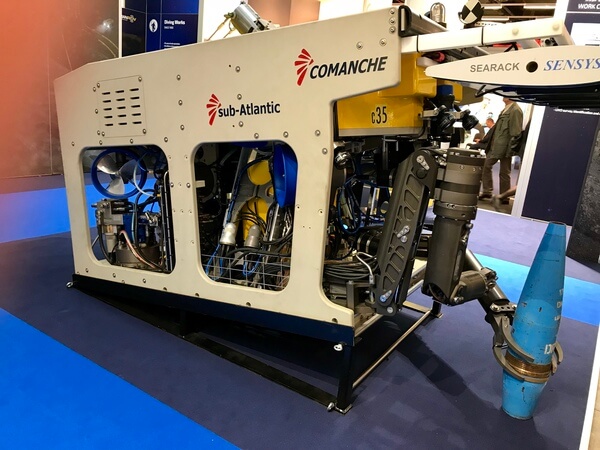
Heavy equipment for offshore use (Image: K. Radtke)
In fact, the offshore industry initially found it difficult to gain a positive foothold in the German public opinion, because grid connections were not finished on schedule. But the tide has long since turned: Germany is the second largest offshore wind producer after Great Britain. Accordingly, Birol is also focusing on this area: "Offshore has the advantage that large turbines can be used. In addition, there is a constant wind blowing at sea and meanwhile the industry also has the support of the governments". Outside Europe in particular, he sees enormous growth opportunities for the sector in the coming years, especially in Asia and North America.
"New jobs will also be created here in the future," emphasizes Tacke, referring to Cuxhaven, where Siemens Gamesa recently built a new plant for offshore production. The city has been running smoothly ever since, with many suppliers following the manufacturer and settling there. This can also be seen at the fair, where the German seaports are courting attention with large stands.
Another area coming up with innovations is the service sector. For some time now, drones have been in use to support people. Depending on the customer's requirements, the flying machines can be equipped to detect damage to the systems visually, with thermal images or even with ultrasound.
More and more companies are using the flying robots. They do a great job and a licence to operate a drone is available for 100 euros. Drones offer several advantages: being weatherproof and much quicker than human workers they can be used on- and offshore. In onshore applications drones have been in service for more than six years now - an investment that pays off.
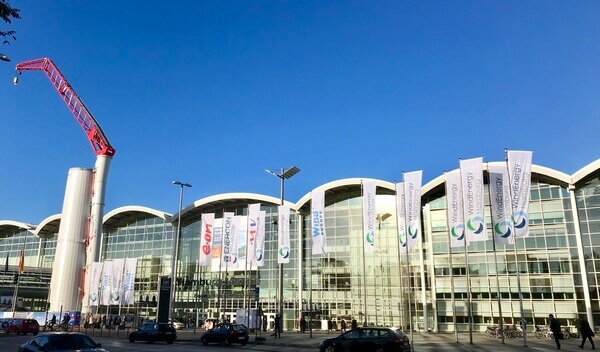
Well visited: Hamburg's exhibition halls (Image: K. Radtke)
In addition to technical enhancements and new developments, the focus of the trade fair is increasingly on interaction with other areas like the combined use of wind and water or storage options.
"We're moving beyond pure electricity production," said Ben Blackwell, CEO of co-organiser Global Wind Energy Council (GWEC). This is where the journey will take us in the future.
- Author:
- Katrin Radtke
- Email:
- press@windfair.net
- Keywords:
- WindEnergy, trade fair, fair, event, drones, offshore, onshore, robots, jobs, turbine, Hamburg

